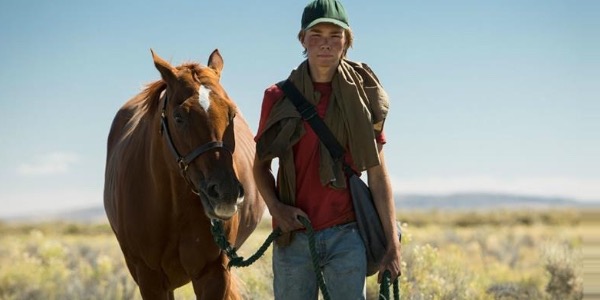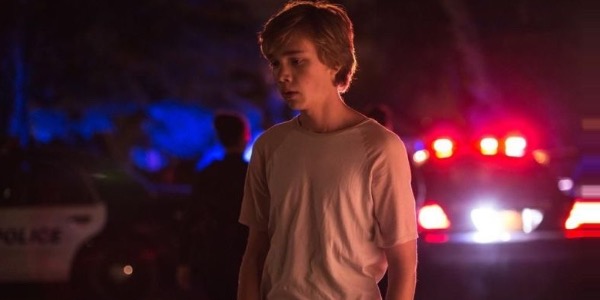LEAN ON PETE: No Room For Horsing Around In Andrew Haigh’s Emotional Triumph

Alistair is a 25 year old writer based in Cambridge.…
There’s an innate romanticism whenever a British filmmaker makes their first film across the Atlantic, especially when working within the realism genre. Even if you’re documenting the trials and tribulations of the working classes on both sides of the pond, there’s always going to be a greater fantastical grandeur to the sweeping plains of America than there is a rainy council estate in downtrodden Britain.
Andrew Haigh is the latest British dramatist making his cinematic debut in America (not counting his San Francisco set HBO series American Honey last year, life spent drifting on the road in the States feels all the more engrossing when documented by an outsider looking across this sweeping foreign land.
An Equestrian tale that’s far from pedestrian
Adapted from the novel by Willy Vaultin, Lean on Pete tells the story of Charley Thompson (Charlie Plummer), a motherless 15 year old whose relationship with his father (Travis Fimmel) is largely confined to seeing him pick up random women and get beaten up by other men. Having just moved to Portland and in desperate need of money, Charley is constantly on the lookout for work. One day, he unexpectedly bumps in to Del (Steve Buscemi), a horse trainer who needs extra help taking his forces to an out of town race.

Charley is immediately drawn to Lean on Pete, whom Del regards as the least exceptional of the bunch. Lean on Pete is a merely average horse, whose fate will be sealed after losing just one more race, where he will be sent down to Mexico to be slaughtered. With his home life in disarray, Charley ends up becoming emotionally attached to the horse’s fate. After losing his feted final race, he silently disobeys Del’s orders and drives away with it across the country, with no clear destination initially in sight.
Haigh’s film is a wondrous cross between the aforementioned American Honey, and Caroll Ballard’s 1979 adaptation of The Black Stallion, combining the gritty road trip elements of the former, with the against the odds equine survival tale of the latter, and containing cinematography that is every bit as beautiful as either of these visually accomplished works. The comparison to The Black Stallion isn’t a flippant one, as it runs deeper than the mere surface level observation that this is another tale of a lost youth and his horse.
This is primarily a coming of age tale, after all, but one that’s told through the prism of the boy’s increasing emotional dependency on the horse’s survival. This isn’t about an unusual friendship between a man and an animal, but rather a boy’s need for friendship and to be in control of somebody’s fate when he’s stranded and left to feel hopeless by circumstances under which he’s had no control.
Flawed Characters, Wonderful Performances
After having his mum walk out on him at an early age, and his father increasingly absent (for reasons this review shall not elaborate on) the need to ensure no other relationship ends prematurely is a priority for Charley. As played by Charlie Plummer, he is an endearingly empathetic figure, with an arc that appears to be tragic to the point of depression, as we follow him run further from his home, with the threat of poverty and homelessness increasingly hanging over his head. Haigh’s film is undeniably miserabilist, taking cues from directors like Robert Bresson in his depiction of a very believable form of suffering, but it never feels cruel.

Charley makes bad decisions, but Haigh never punishes him for it, nor does he judge him; this is aided by Plummer’s performance, one that feels understated considering the circumstances of the character’s life. All sadness is hidden, replaced only by a desperation for survival that remains unspoken, yet ever present in all his questionable actions. We hope to never be able to relate to this character’s life, but Plummer’s performance makes it feel relatable nonetheless.
Haigh always manages to get fantastic performances out of his actors, and the ensemble he’s assembled here all shine. It’s no surprise to say that Buscemi is a stand out as Del, but what is a surprise is how Haigh treats the character with evenhandedness, where lesser filmmakers would make him a one-note point of contempt. Buscemi is, of course, more than at home launching into foul mouthed tirades (he’s even introduced, off screen, ranting away), but Haigh elsewhere paints him more sensitively as a man out of time; a white collar throwback in a changing nation.

As Charley’s father, Travis Fimmel gives the role a humane warmth that is miles away from a routine “deadbeat dad” archetype. He’s clueless, but he genuinely cares about his kid, forever giving what he believes is worthwhile life advice, even if it is a worthless opinion that “the best women have all been waitresses”.
Also joining the ensemble are Chloë Sevigny, as a jockey associate of Del’s who is forever on the peripherals of his social circle- a strong athlete, but one that doesn’t fit into his boys club mentality. Outside of Charley, Sevigny gives the most immediately empathetic performance, stretching a fairly minor role a long way due to her abundance of charm. Only Steve Zahn plays a character who is ferociously unlikeable; a great extended cameo performance in the film’s latter stages, but one that does challenge the film’s otherwise winningly even handed approach to characterisation.
Lean On Pete: Conclusion
Haigh manages to have an intuitive relationship with his actors, prioritising performance over signature visual flourishes. Here, in collaboration with Danish cinematographer Magnus Nordenhof Jønck, he too making his debut film in the States, he manages to capture beautiful, wide sweeping vistas, yet never lets the stunning visuals overpower the story that he’s telling.
It’s undeniably his most sweepingly cinematic film to date, but his ethos hasn’t changed. In Lean on Pete, characters are first and foremost, leading to an finished product that is a knockout emotional triumph.
What are the best (and most moving) films about the relationship between humans and animals?
Lean on Pete is released in the UK on the 16th February 2018, with a US release from A24 to follow.
Does content like this matter to you?
Become a Member and support film journalism. Unlock access to all of Film Inquiry`s great articles. Join a community of like-minded readers who are passionate about cinema - get access to our private members Network, give back to independent filmmakers, and more.
Alistair is a 25 year old writer based in Cambridge. He has been writing about film since the start of 2014, and in addition to Film Inquiry, regularly contributes to Gay Essential and The Digital Fix, with additional bylines in Film Stories, the BFI and Vague Visages. Because of his work for Film Inquiry, he is a recognised member of GALECA, the Gay & Lesbian Entertainment Critics' Association.













